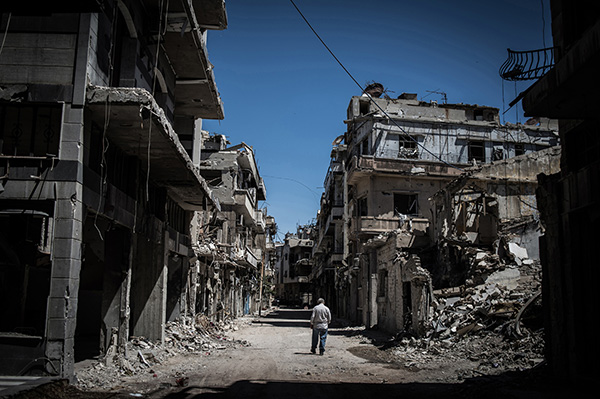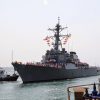
After six years, the situation in Syria has become a world war on a small, concentrated scale, although with terrible consequences for its inhabitants.
Let’s begin with the largest players: the US and Russia. What we are witnessing is not a cold war but a classic confrontation of powers –that are managing to avoid squaring off directly–. Apart from aerial attacks (and they have reached agreements to avoid attacking each other by mistake), they do this through proxies whom they help to train. They promise that it will not be another Iraq (the US), or Afghanistan (Russia). They also negotiate, and will have to go back to talks in the future. Although the central issue is whether, in order to secure peace and continue pushing the Islamic State (ISIS) back, it is not so much the regime as Assad himself who is now saved, something that would be a victory for Moscow and a defeat for Washington.
The main US objective is to avoid destabilising the region even further and to push back and eventually defeat the Islamic State, a monster born to a large extent from the botched invasion of Iraq, and make headway in this conflict partly by supporting rebels and others from the air. But its global coalition has not been a great success, because a significant part of the world (Russia, China and Iran, among others) has declined to join it.
ISIS is losing physical territory, which matters locally and directly threatens its idea of a caliphate. Tighter monitoring of the access points to the area it controls and more efficient policing of all countries, but especially European ones, means that the flow of foreign fighters drawn to Syria and Iraq is being stanched. But at the same time it has become globalised. The front against ISIS is now global.
The recent ceasefire agreement struck between diplomats of the two sides rapidly blew up in their faces when the US bombed Syrian government forces in Deir Ezzor –‘in error’ according to Washington– and Russia subsequently lent aerial support to Assad’s forces against Aleppo, allegedly using incendiary weapons, which are banned, and against bunkers, not only targeting rebel troops but also the civilian population of Aleppo, which according to the US constitutes a ‘war crime’. The collapse of the ceasefire has emboldened the Syrian regime, which believes it can survive and win against the rebels.
Russia is defending the only true ally it has left in the region, the Assad regime, and the only bases –naval facilities in Tartus and an airbase in Khmeimim– that it has not only in the Mediterranean but beyond the borders of the former Soviet Union. It is looking for others: in Egypt, Iran, Vietnam and Cuba. With Iran it shares support for Assad, the fight against the Islamic State (the only point of connection between many of these players), and opposition to the US and Saudi Arabia. Putin is engaged in a pure power play. The mutual vetoing of Security Council resolutions –a very prudent one sponsored by France and Spain, and another put forward by the Russians themselves (which did not refer to halting airstrikes)– has ended up frustrating matters, including Putin’s visit to Paris. The Russian Foreign Minister, Sergey Lavrov, has accused the Europeans and Americans of ‘Russophobia’ and of taking ‘aggressive steps’ against Russia, including NATO deployments in Eastern Europe; the implication being that many things seem linked.
Putin must think that he has a chance to act as he pleases because, with the US presidential term due to come to an end in January, Obama will not want to take major decisions. If she wins, Hillary Clinton will take a much harder line. But the no-fly zone she was proposing is now much more difficult to establish, given that Russia has de facto control of Syrian airspace. Former General David Petraeus goes much further: he argues for the long-range destruction of Assad’s air force using cruise missiles and other types of attack.
The other major conflict feeding this war is the one that pits Iran –now recovering economically after the end of sanctions– against Saudi Arabia; this has both religious –Shiites against Sunnis– and geopolitical roots, and leaves its imprint on a good deal of what is happening in Syria and the region. Iran backs Assad but opposes the Sunni Islamic State with numerous Iranian soldiers involved in the fray, together with their Iraqi allies trying to recapture Mosul. Hezbollah, Iran’s Lebanese allies, fight alongside government troops. Saudi Arabia, along with other Gulf States, backs the rebels, among which there are offshoots of al-Qaeda, and it has distanced itself from the US.
Neighbouring Turkey, which is a member of NATO, is rapidly de-Westernising, moving closer to Russia (and once again Israel) and has belatedly taken up arms against the Islamic State, although its main target are the Kurds of the PKK. The Kurdish peshmergas are the main combatants against ISIS, however. Looming in the background meanwhile is the eventual prospect of a Kurdish state that would disrupt the regional balance entirely.
The crisis has highlighted the EU’s inability to act, a European trait manifested amid all the Arab uprisings, where, with the exception of Tunisia, they have arrived late and badly. The wave of Syrian refugees has awoken many latent demons in the EU. France launched airstrikes for internal reasons after the ISIS attacks and to prevent ISIS fighters returning as terrorists. And the British did the same, although they have their own headaches with Brexit and their redefinition of what they will be in the world, although they are trying to coordinate with the US, as the meeting with John Kerry shows. Meanwhile, the EU is divided on renewing sanctions against Russia, even within the governing coalition in Berlin, where the Social Democrats are opposed.
And China? Although it is a highly-focused world war, the second-ranked (and in many ways foremost) power on earth may also have an opinion. And it does, with three priorities: good energy links with all players in the region, since it needs its oil and gas; a mutual understanding with those that question the Western world order, like Iran; and preventing Islamic State’s influence from reaching its own most westerly territory, essentially that of the Uyghurs. It often abstains on these issues in the Security Council. Although not wanting to get involved directly, it seemed to side this summer with Bashar al-Assad and Russia with a visit to Damascus by the high-ranking Guan Youfei, director of the Office of International Military Cooperation, which comes under the powerful Central Military Commission led by Xi Jinping himself. According to the official Chinese news agency, Xinhua, he offered humanitarian aid and training for Syrian military personnel.
All the ingredients are present, including the global threat of the Islamic State. The fact that it has turned into a concentrated world conflict will hinder the search for a solution to the civil war –or civil wars– in Syria. It is not a matter of ensuring that the world, and the region, manages to ‘coexist’ with the conflict, because contagion could be tragic. In the end Russia and the US will have to reach an understanding. As shown, however, such an understanding depends on other factors and will not be sufficient. But it is necessary, not to say indispensable.


